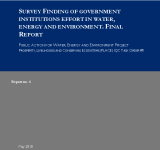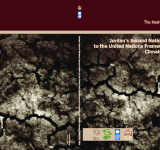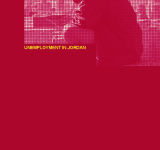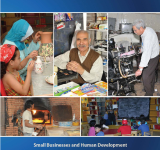In 2006;; the Sultanate of Oman undertook a project that aimed to support the implementation of the country’s vision towards conservation of biological diversity in the Sultanate of Oman. This report serves as an “evaluation and assessment of capacity building in the field of traditional knowledge related to biodiversity.” The report aims to describe the state of traditional knowledge on biodiversity in Oman;; assess capacity-building requirements in relation to traditional knowledge;; and provide a set of recommendations with a strategy for the protection and maintenance of traditional knowledge on biodiversity conservation. Various topics related to biodiversity are covered;; including irrigation;; tree cultivation;; crop improvement;; livestock management;; and soil and water conservation. The methodology used depends on three sources of information;; including a review of secondary data;; in-depth interviews;; and a participatory workshop.
والزراعة
The report presents the findings of the government institutions efforts survey;; which is designed for the purpose of reviewing the government agencies’ current and past communication activities in water;; energy and environment. The specific objective of this survey is to review the Donor Position Paper on Outreach targeted sample of 36 staff from 22 government institutions from Aqaba and Karak. As part of the Public Action for Water;; Energy and Environment Project (PAP);; a public education and behavior change communication program developed to support USAID’s technical and policy investments in the Jordanian water and energy sectors;; this report finds that many government institutions have more than one role;; overseeing solid waste management;; industrial water and reuse and environmental laws. The report also finds that the communications programs are scattered and credibility and trust between service agencies and their clients is a concern. The interview analysis suggests that the Public Action Project needs to focus on two or three specific areas;; and the report recommends all capacity building activities to be focused on one goal of developing;; implementing and measuring national communication strategies and action plans.
This report is the result of the long;; tedious and creative work of many Jordanian experts who together have reflected the most comprehensive outlook about climate change in the Jordanian context and outlined Jordan’s efforts in addressing the phenomena and the impacts of climate change. Whether in greenhouse gas inventory;; adaptation and mitigation options the readers of this report will find answers about Jordan’s minor contribution in emissions and major vulnerability to climate change impacts
This pilot study report was initiated by the European Training Foundation (ETF);; in close cooperation with the National Center for Human Resources Development (NCHRD) in Jordan;; in the framework of the ETF multiannual project Observatory Function Development in Jordan. The focus of this report is unemployment. However;; considering that unemployment information in itself should not be used or analysed in isolation from other indicators or data;; the report begins by providing an overview of the general labour market situation in Jordan. After the main data on employment by sector;; age;; gender and level of education are presented;; on the basis of the available information;; the specific cases of non-Jordanian employees and employment in the informal economy are highlighted as topics requiring special attention in the Jordanian labour market. In conclusion;; two groups of recommendations are proposed: (i) technical recommendations to main information providers for improving the quality of the information collected;; and (ii) a set of policy recommendations for tackling unemployment. These recommendations are intended to support policymakers in their commitment and willingness to adapt both the formal and informal education and training system and the whole labour market in Jordan.
This report explores the role of Small and Medium-Enterprises (SME);; as an agent for sustainable human development in Jordan. It analyzes SMEs and their contribution to human development using fours key central pillars of human development;; namely: economic growth that is equitable and pro-poor;; social progress;; participation and empowerment through micro finance;; and environmental sustainability. The report analyses the link between SMEs and empowerment or lack thereof;; with a specific focus on the two issues of employment;; as a tool for empowerment;; and the capacity of SMEs to enhance the position of women within the workforce and home. The report findings were based on extensive research;; a survey of 1;;500 firms and focus groups discussions conducted across the governorates of Jordan. The report proposed general recommendations in terms of institutional coordination;; exports;; cluster groups;; quality standard;; government monitoring;; tax law;; local development;; youth empowerment and the increase of minimum wage.




